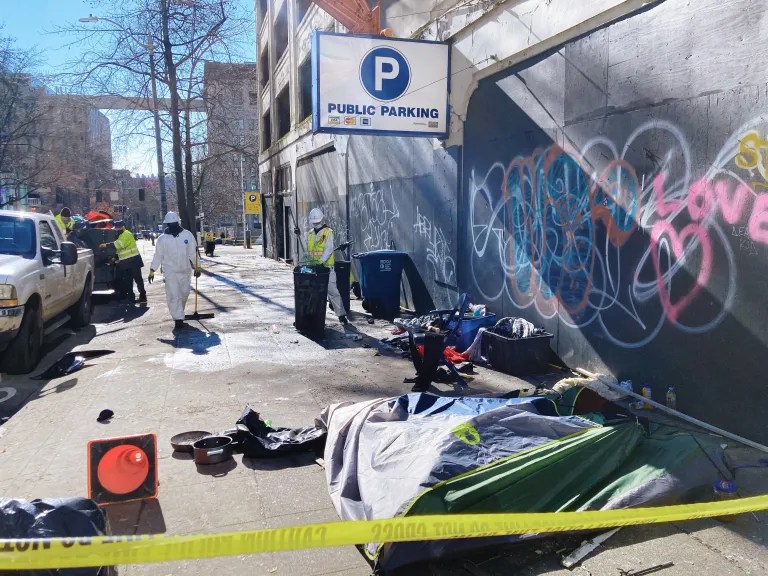
By Erica C. Barnett
The city’s Human Services Department has asked the King County Regional Homelessness Authority to modify its contracts with outreach providers (including the city’s largest outreach provider, REACH) to require them to show up and offer services to unsheltered people up to the day their encampments are swept.
REACH does not have a strict policy against showing up before encampment sweeps; instead, they make decisions on a case by case basis, REACH director Chloe Gale said. In 2019, the group decided to withdraw from the Navigation Team, a group of police and city outreach workers that used to be in charge of encampment removals, because of concerns about their ability to build trust with clients while appearing to participate in sweeps.
UPDATE: On Friday, a spokeswoman for the KCHRA told PubliCola the authority “confirmed with the City that we are not making any contract modifications.”
In a message to council members, the department said that its HOPE Team—a group of city staffers that connects people whose encampments are about to be swept to beds in shelters to which the HOPE Team has exclusive access—is “often the only entity on site that’s willing to make shelter offers and connections during the posting period (i.e., the time between a site being posted and the time of the removal).”
A spokesman for Mayor Bruce Harrell said the mayor “support[s] providers offering outreach and service connections to encampments before the day of removal.”
UPDATE: On Friday, Deputy Mayor Tiffany Washington and KCRHA CEO Marc Dones said in an email to homeless service providers that “despite what you might have seen in [PubliCola’s] recent article” (the one you are currently reading), “KCRHA has not received any requests from the City of Seattle that would change our shared approach to outreach responsibilities.” The Human Services Department confirmed its request for contract changes, provided the request to PubliCola in full, and explained the intent of the request in more detail in an email, and PubliCola stands by our reporting.
REACH and other outreach providers’ “choice to withhold support is believed to be counterproductive to supporting those experiencing unsheltered homelessness,” HSD wrote. “We have asked KCRHA to modify their contracts in a way that uses the City’s funding to support our target population throughout the entire process rather than just a portion of it.”
In recent years, the city has largely abandoned the previous practice of providing 72 hours’ notice before it removes an encampment, a timeline that gave encampment residents time to move into shelter or relocate their tents. Instead, the city designates encampments as “obstructions,” a broad term that can be applied to any tent in any public space, and removes them with little or no advance notice.
This is not the first time the city has attempted to include a requirement to participate in sweeps in its contracts with outreach providers; former mayor Jenny Durkan made a similar attempt last year, but ultimately backed down after some nonprofits said they would refuse to sign contracts that included this stipulation.
Outreach providers’ “choice to withhold support is believed to be counterproductive to supporting those experiencing unsheltered homelessness,” HSD wrote. “While the funding for these contracts continues to come from the City of Seattle, the oversight of contracts, and the ability to modify those contracts, now live with KCRHA. We have asked KCRHA to modify their contracts in a way that uses the City’s funding to support our target population throughout the entire process rather than just a portion of it.”
Responding to questions about the city’s request during the council’s homelessness committee meeting Wednesday, KCRHA director Marc Dones said the authority had not “entered into any conversations at this point around modifying contracts with providers. What we are discussing at this point is working to support humane responses to folks that are at our prioritized encampments”—that is, encampments the city prioritizes for removal.
HSD spokeswoman Stasha Espinoza said HSD “has yet to request RHA’s assistance with making outreach available on the day of a removal, and that in for now, “HSD has asked their System Navigators”—the HOPE Team’s outreach workers—”to make offers of shelter prior to and during a removal. This includes transportation to a shelter if such services are requested.”
The reignited debate over the role of contract outreach workers in encampment removals points to a problem baked right into the new homelessness system: The city is the primary funder for the KCRHA and has to approve the authority’s budget every year, which gives it significant power to determine how the authority spends its money; meanwhile, the city retains control over encampment removals and has its own system for referring people to shelter that is independent from the KCRHA and holds exclusive access to one third of Seattle’s shelter beds.
Conflicts are inevitable. The question of whether outreach providers should be forced to participate in sweeps as a condition of receiving city dollars is neither the first nor the last that will arise from this odd arrangement.
